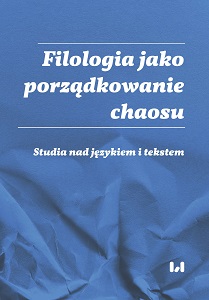Hiponimizacja polskich ekwiwalentów greckich leksemów z pola semantycznego DZIECKO w Nowym Testamencie Biblii Jakuba Wujka (1599)
Hyponymization of Polish equivalents for Greek lexemes from the semantic field CHILD in the New Testament of the Bible of Jakub Wujek (1599)
Author(s): Tomasz Lisowski
Subject(s): Theoretical Linguistics, Studies of Literature, Philology
Published by: Wydawnictwo Uniwersytetu Łódzkiego
Keywords: rendering of the Bible; transmission of the biblical sense; semantical equivalence; hyponymization; viralization
Summary/Abstract: In the New Testament of the Bible by Jakub Wujek (1599) some equivalents of Greek lexemes from the semantic field CHILD, i.e. παιδίον, παίς, τεκνίον, τέκνον, that are semantically ambivalent in terms of the gender, are subject of unjustified contextually hyponymization. Their Polish equivalents chłopię, pacholę, syn, synaczek, synowski depicts the male gender. That hyponymization takes effect in the viralization of the authentic Greek biblical sense in Polish. That semantical shift reflects a system of values of that times, and could have been justified by philological reasons since the Latin Vulgate was a primary rendering source text for Jakub Wujek. An expression synowie boży rendered for a Greek τέκνα τοῦ Θεοῦ, is an extreme example of the that kind of viralization. The similar state of affairs rules in the New Testament of the Protestant Brest Bible (1563) and in most cases in earlier rendering of the New Testament by Jakub Wujek (1593). However in the New Testament of the Gdansk Bible (1632) rendered by Daniel Mikołajewski in most cases ambivalent in terms of gender expressions: dziatki boże, dzieci boże, dzieci miłe, naśladowcy boży are implemented. Thanks to that they are closer semantically to meaning of the Greek original text.
- Page Range: 183-200
- Page Count: 18
- Publication Year: 2018
- Language: Polish
- Content File-PDF

